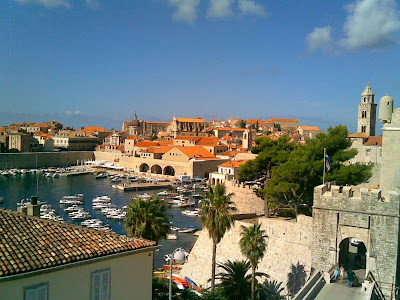Not just because it was where I was born and every time I turn up in Rome, it feels a little like a homecoming, even though I left when I was thirteen.
Not just because you can walk around in shirtsleeves in February and March when in England we still need coats, and waterproof coats at that.
Not just because the setting for the work is often spectacularly beautiful – having come through Venice on the way here, I can confirm that it does rather edge it over my current hometown of Luton (even if Luton has the occasional gem, all the more precious for being so rare…)
 |
| Jewels of Venice and Luton Poor old Luton has its own. Just not at every turn... |
I’ve recently been struck by the excessive use of the word “awesome” (or rather “ahsome”) by my American colleagues. It has to be said that my bright American boss did point out to me that we’re just as bad, in England, with the word “brilliant”. I thought that was a brilliant observation.
Places like Venice are, however, literally awesome. I’m using the word “literally”, like the word “awesome”, literally. They inspire awe, and awe is good. But I can’t help feeling that humour’s even better.
The meeting in Venice wasn’t actually in the old city but in Mestre, which is on the mainland opposite. The offices we went to were in Via Mestrina, which I believe means “street in Mestre”. It may just be me, but I couldn’t help smiling about that – it strikes me that all the streets in Mestre are mestrine, so how could the naming be anything but ambiguous?
Or do I mean multibiguous?
Still, that was only a momentary amusement. The real prolonged laugh came when we travelled back to Venice (we wanted a bit of awe, and staying in Mestre would have been a little flat).
Our train was due to leave from Platform 6, but as we reached to the top of the stairs, we saw the sign turn blank. We rushed back downstairs and saw that there was a train due on Platform 3, but when we got to the top of those stairs, discovered that the sign there was blank too. Fortunately, a helpful voice was making an announcement over the PA system.
“The 17:30 train to Venice is approaching platform 9.”
Down the stairs. Back up to platform 9. Just in time for a new announcement.
“The 17:30 train to Venice, scheduled to leave from platform 9, will now leave from platform 11.”
Downstairs. Upstairs.
The sign proudly forecast the arrival of the train at platform 11 in a few minutes. Then it went blank.
From where we were standing, we could see platform 9 and the sign on it. “17:30 Venice”. It felt slightly Orwellian: “the train is leaving from platform 9, it has always been leaving from platform 9”.
Back on platform 9 we felt we were onto a good thing at last. It was 17:28. Surely it couldn’t change again?
It didn’t. 17:30 came and went. At 17:32 the sign went blank. Exactly as though the train had come and gone. Neither my colleague nor I had any memory of that happening. Nor, I believe, did any of the other passengers milling around on the platform. We headed downstairs to consult the signs in the underground corridor. The next train was the 17:43 from platform 3. Once more, we climbed the stairs to that platform.
As we reached the top of the stairs, the helpful announcer gave us some more, and invaluable, information.
“The train now approaching platform 6 is the 17:38 for Venice.”
It really was approaching – we could see it – so it felt like a safe bet for once. But time was short. We ran down the stairs, along the corridor, and back up on to platform 6.
Which, if you’ve been following this tale carefully, you’ll remember was the first one we tried.
The train stopped. We climbed aboard a little suspiciously, worried that it might pull back out the way it had come and dump us all in Udine. But no, it carried on down the track and into Venice, bringing us once more into the joy and wonder – and awe – of canals and palaces, gondolas and bridges.
But in the meantime, we’d had an experience that reminded me of, I believe, Monsieur Hulot’s Holiday. If I remember, there’s a scene in that classic film where a large number of passengers shift from platform to platform in a station, in response to a series of incomprehensible announcements, only to see the train eventually arrive at the platform they started from. Can you imagine the sheer joy and amusement of reliving a classic French comedy? And our experience lasted far longer than the film scene – no director would ever dare make it that long, worried that it might seem implausible.
It's not implausible in Italy.
Venice is just ten minutes by train from Mestre. Our rushing from platform to platform had lasted at least twenty. And I reckon the exercise we’d had was more than had we walked across.
Ah, Italy, Italy. Beautiful. Warm. Friendly.
Awesome.
And inimitable.
